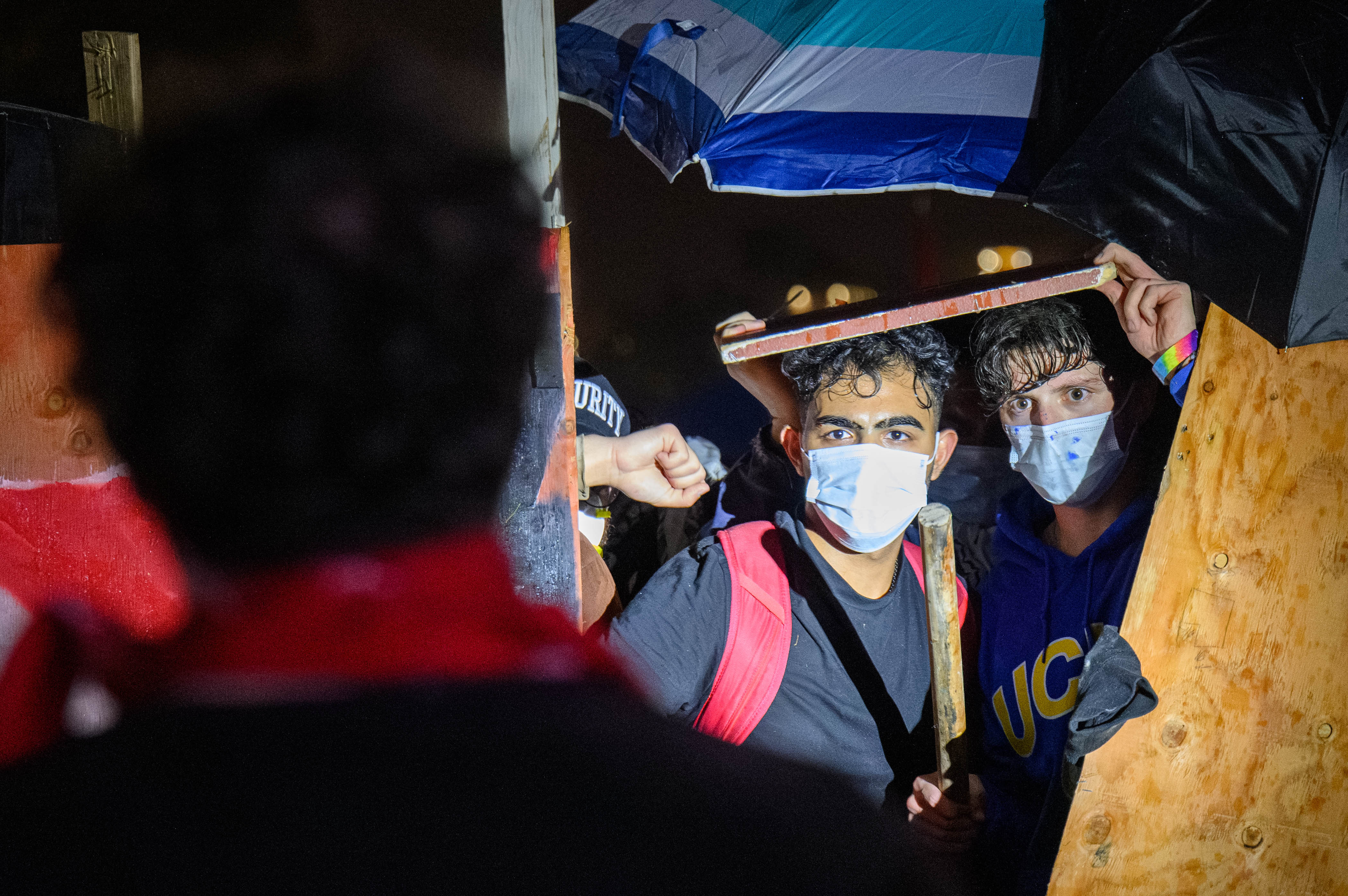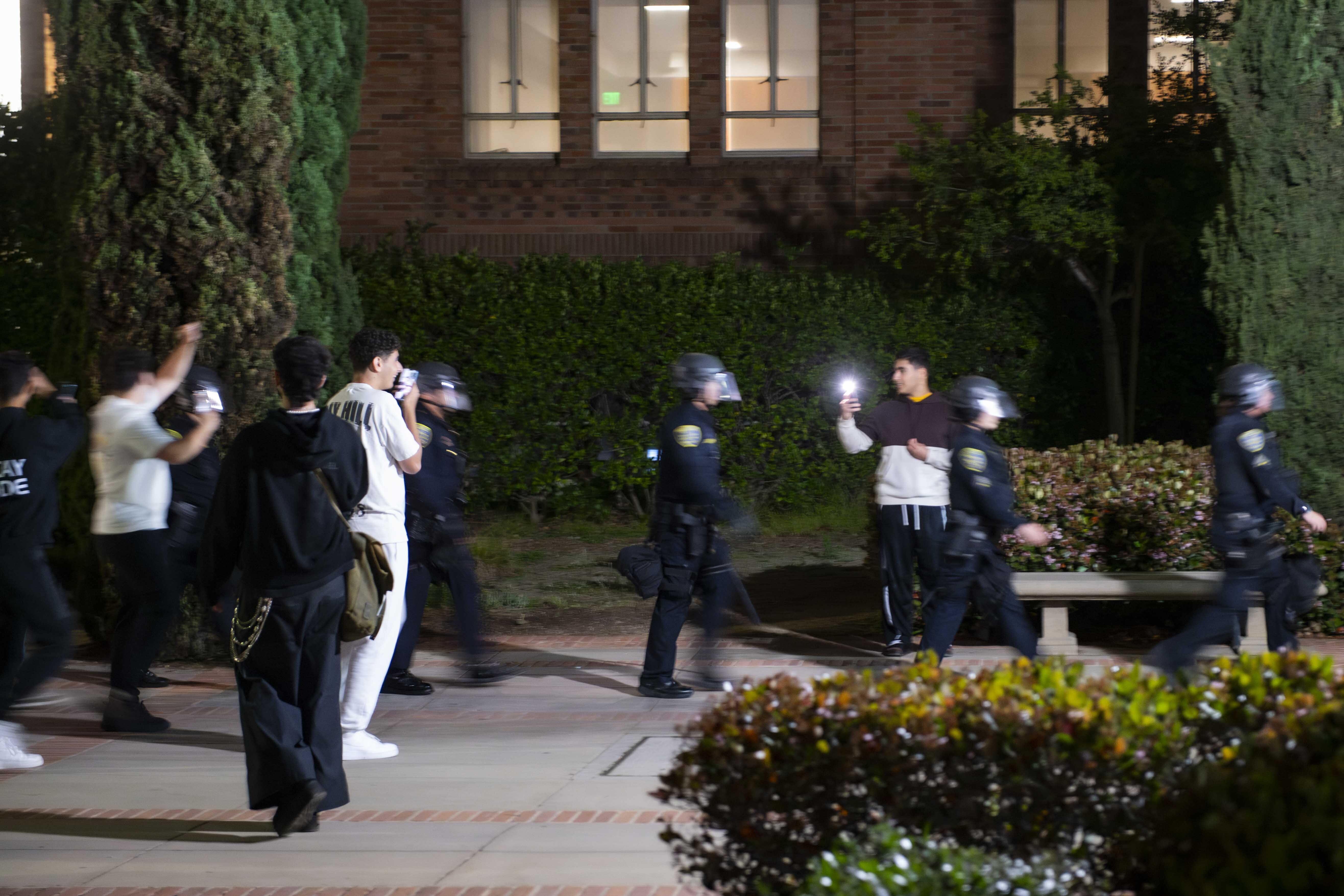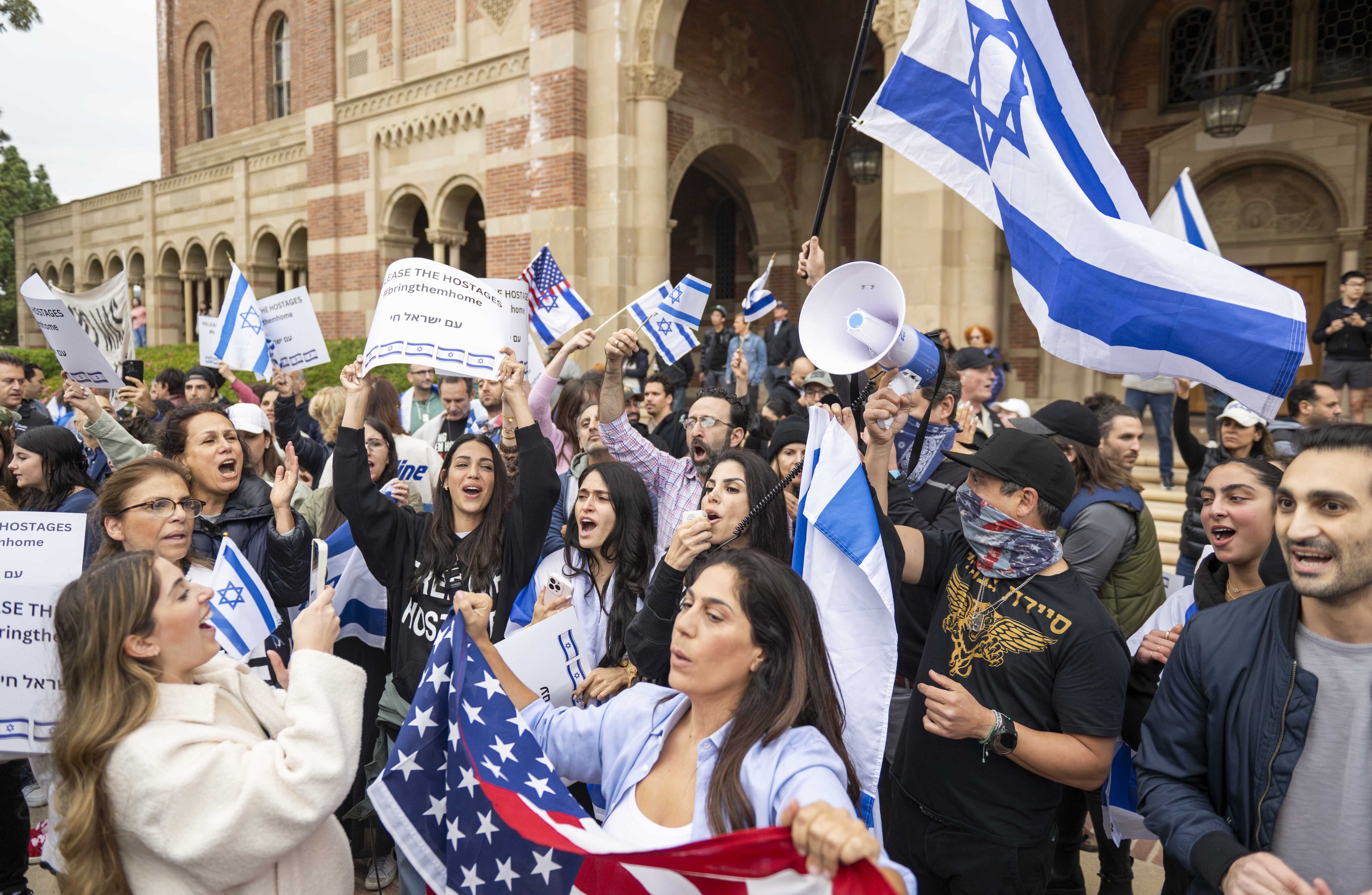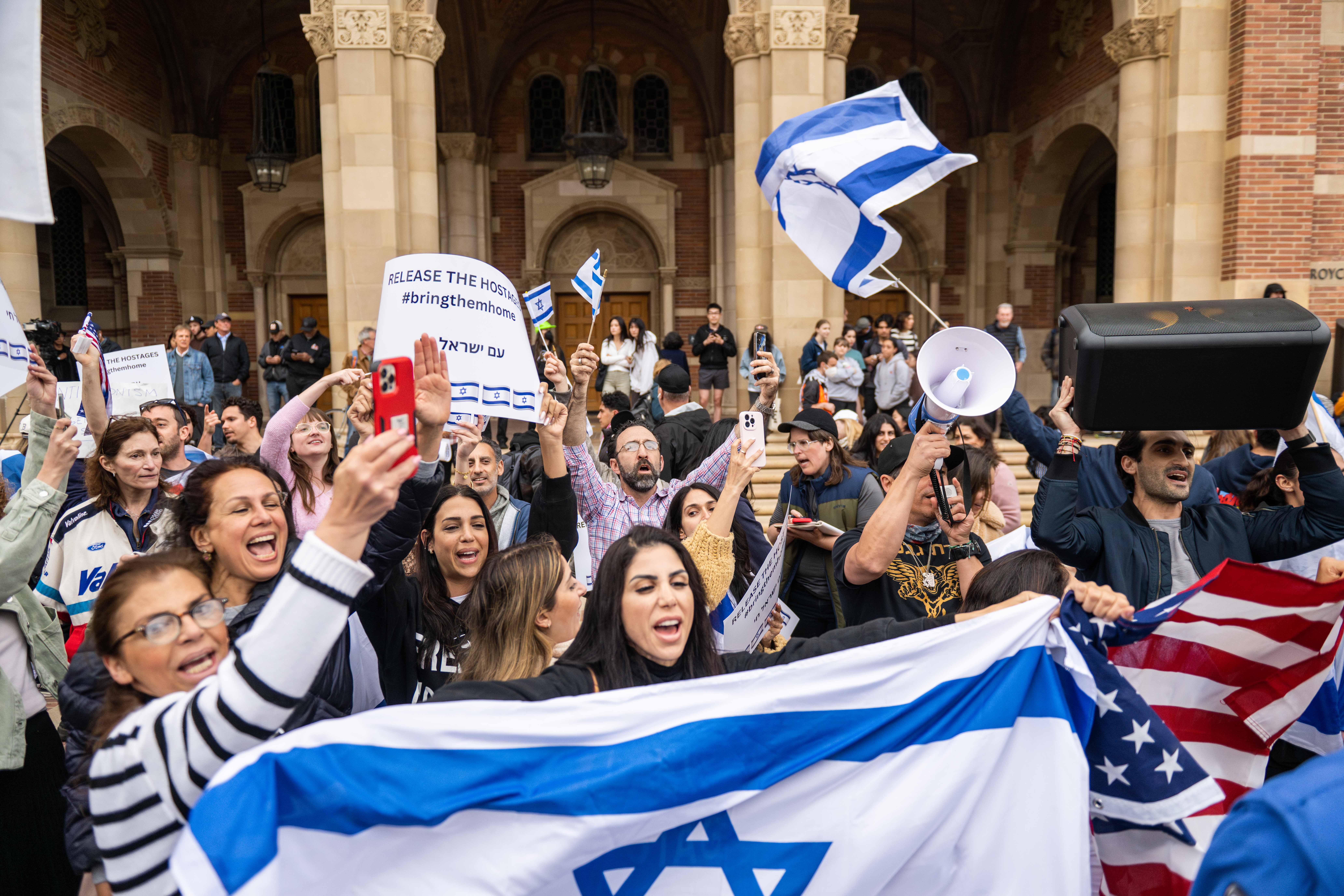This Week: Encampment at UCLA

Photo credit: Helen Quach
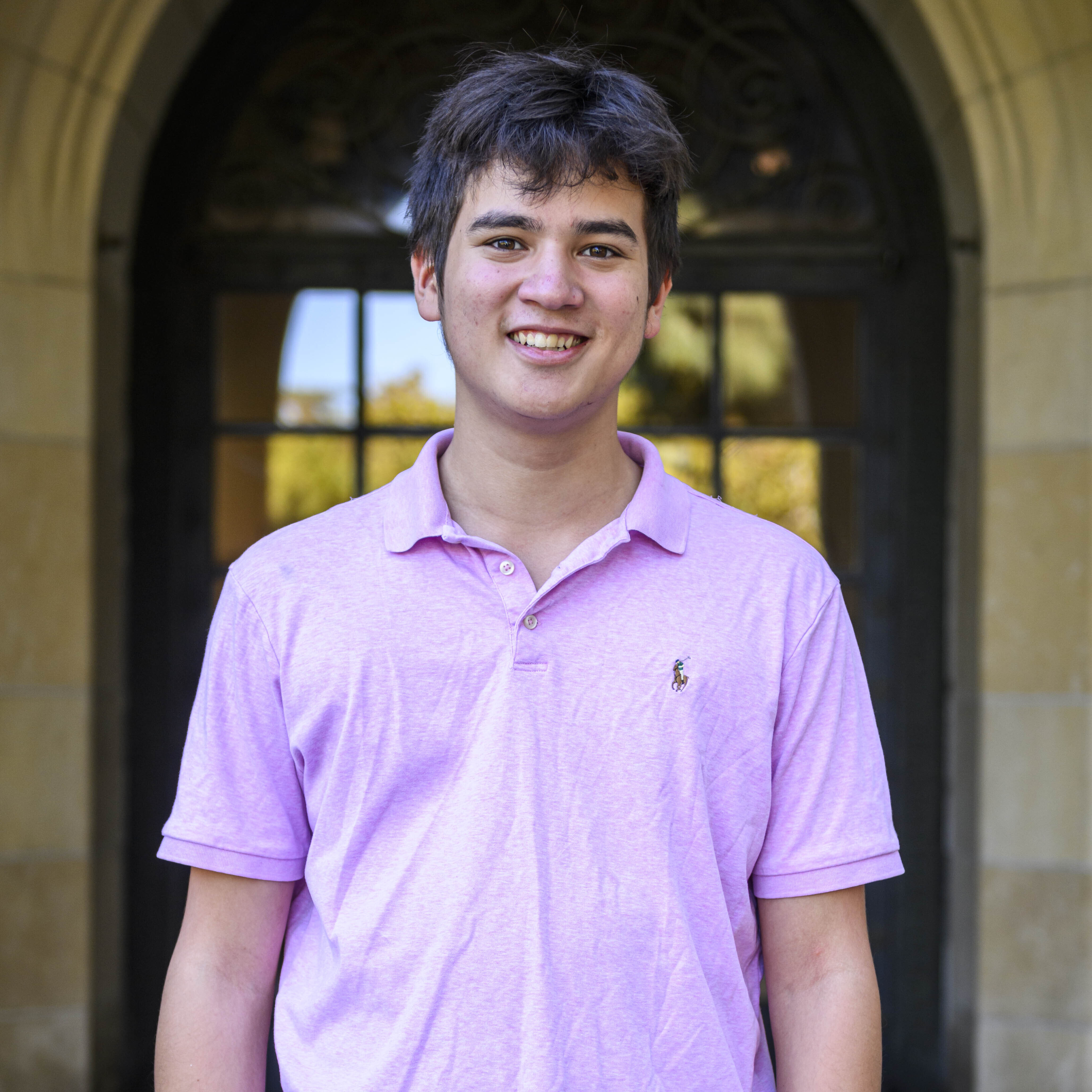
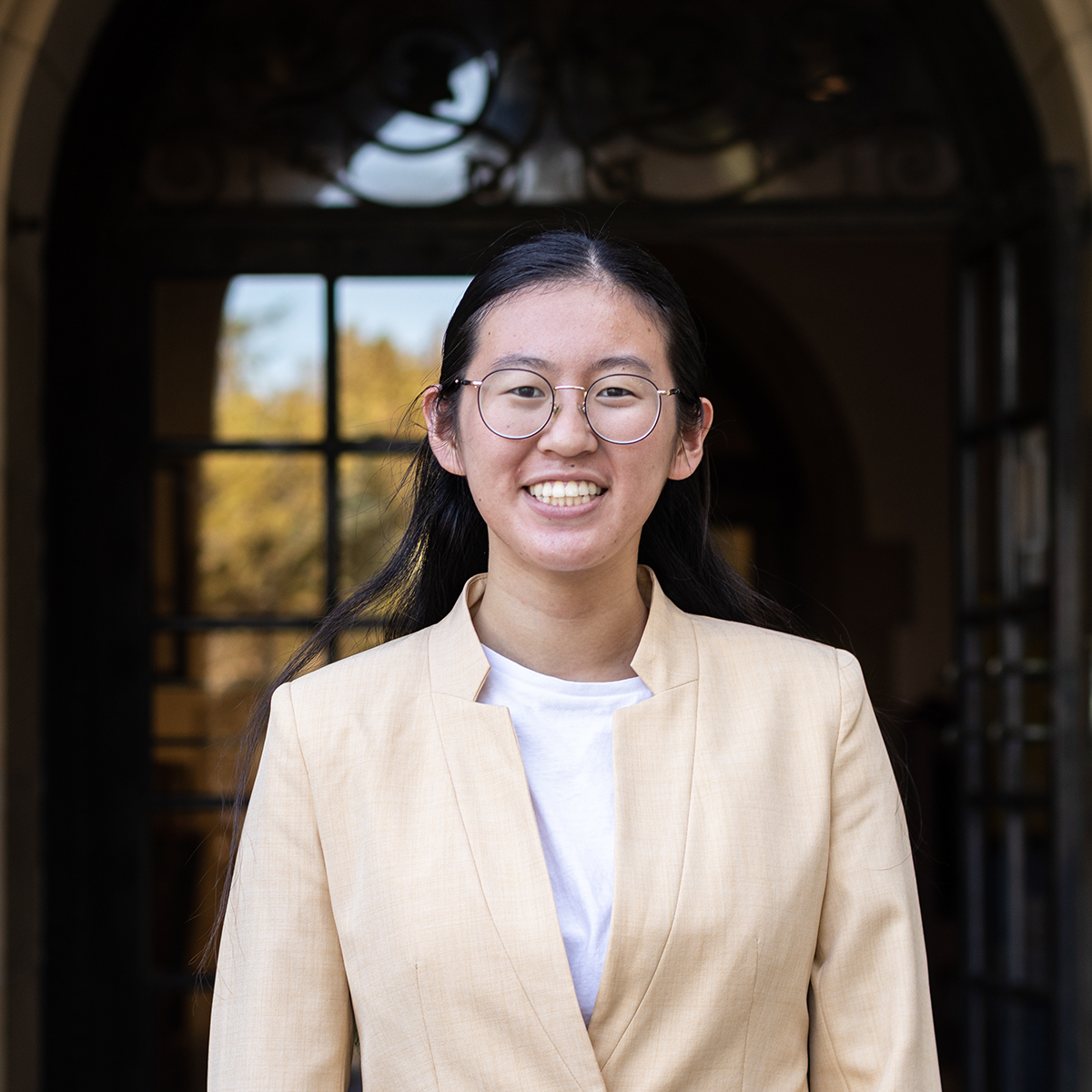
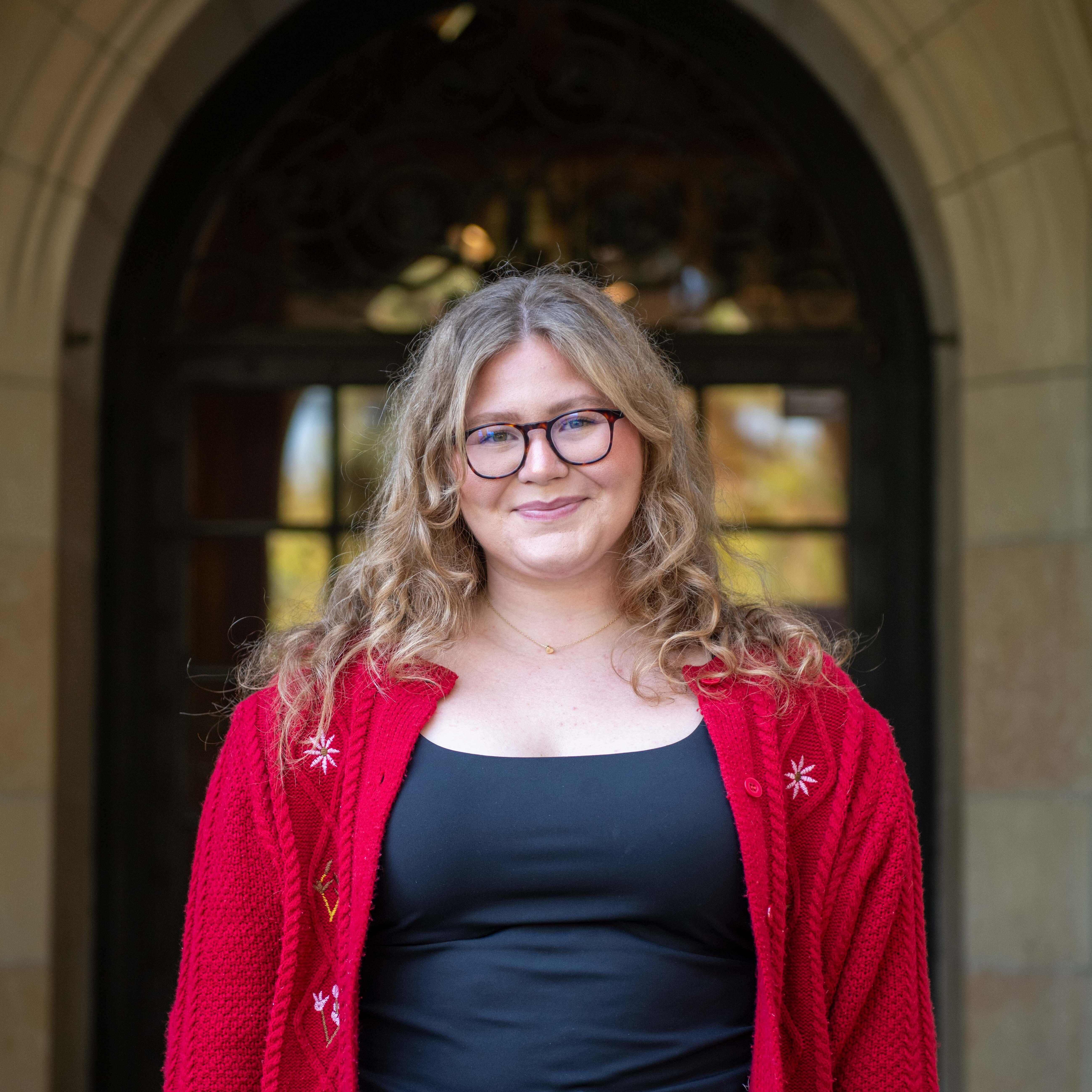
By Jack Garland, Dylan Winward, Anna Dai-Liu, Sharla Steinman, and Sofia Alcomendas
May 4, 2024 5:43 p.m.
“Our campus is in deep pain,” said UCLA Chancellor Gene Block in a statement released Thursday. After a week of tension, violence, and chaos, the Daily Bruin News editors join the show to discuss recent events on campus—from the establishment of the UC Divest Coalition and Students for Justice in Palestine at UCLA encampment to the policy dispersal Thursday morning. Podcasts contributor Sofia Alcomendas also joins the show to discuss a potential ceasefire deal in Gaza and encampments on college campuses across the country.
Jack Garland: This week has been a historic one at UCLA. On last week’s episode we reported from outside of the encampment that formed last Thursday in Dickson Plaza. And a lot has happened since then. Today I brought in the Daily Bruin News editor team to walk us through the series of events that transpired since last Friday, April 26.
Today’s Friday, May 3, and you’re listening to This Week by Daily Bruin Podcasts.
Hi, everyone. Thank you for tuning in today. I’m Jack Garland. I’m the Podcasts editor, and I’m joined by four Daily Bruin News editors. Dylan Winward, the features and student life editor. Catherine Hamilton, the News editor. Anna Dai-Liu, the science and health editor. And Sharla Steinman, the city and crime editor. News team, thanks for coming on. You all have been doing some really excellent reporting over the course of this past week. So it’s really great to have you all here together. Last Friday, we reported that Students for Justice in Palestine and the UC Divest Coalition had formed an encampment at Dickson Plaza to call for the university to divest from companies associated with the Israeli military, among other demands. There were some violent clashes in the early hours of Wednesday morning. And then in the early hours of Thursday morning, the encampment was cleared by police.
Dylan, can you tell us what happened over the weekend and into early this week that led to this escalation?
Dylan Winward: Sure. So what we saw on Saturday was actually a relatively calm day at the encampment. Faculty members who are members of Faculty for Justice in Palestine showed up at the encampment. They wanted to show their support to students who were protesting and who were camping outside of Royce Hall. Many of the faculty brought their children to sit in the Royce arches as well. There was a small number of counter protesters, mainly students really who were on site wearing Israeli flags, but they weren’t aggressive. There was minimal chanting. We know as well that within the encampment, there was a significant amount of programming that included teachings, prayer circles, and other interfaith discussions. We know that the encampment was asking for supplies. Alex Crosnoe and Patrick Woodham wrote a piece over the weekend about how they were using restrooms and campus buildings and asking for donations from community members of food, electricity generators and other similar infrastructure needed to maintain the encampment. We also tracked on Saturday, a significant campaign on GoFundMe to raise money for a counter protest supporting Israel. As of Saturday, that campaign had raised $50,000. Now the GoFundMe stands at $96,000.
JG: So what happened as the encampment entered its fourth day on Sunday?
DW: Yeah, so we know that within the encampment, they were expecting a significant number of counter protesters. A rally was given a permit from 11am to 1pm by the university for a counter protest in support of Israel that attracted a significant number of speakers Dan Gold, the executive director of Hillel at UCLA. Members of the Jewish Faculty Resilience Group, and the Consul General of Israel in Los Angeles actually spoke at that event. There was the singing of American and Israeli national anthems as well. With a significant professional presence of sound systems and screens. Thousands of people actually showed up to the Royce squad in advance of that. The encampment actually expanded to include a wider area. They took the arches under Royce Hall as well to expand that perimeter all the way across the breadth of Dickson Plaza. And we know that security hired by the campus from CSC set up barricades. So those were kind of metal fences on the lawn between Kaplan Hall and Haines Hall in order to separate different protest groups. They also set up barricades around where the counter protest was scheduled to happen. However, what we saw happen on Sunday morning was a variety of groups present, as well as the encampment and the counter protests supporting Israel. A significant number of people came to support in solidarity with the encampment. We know they were led by the Palestinian Youth Movement. And they actually came and knocked over the barricades that were supposed to separate the pro Israel counter protesters from the outside. So from Dickson Plaza, Dickson Court, sorry, we know that those barricades were knocked over and there were clashes between the protesters and counter protesters. Immediately after those clashes began, we got a statement from Mary Osako, the UCLA Vice Chancellor for Strategic Communications. She said that “UCLA has a long history of peaceful protest, and we are heartbroken to report that today some physical altercations broke out.” However, our reporters at UCLA and on site did not see a significant increase in security after those clashes on Sunday. We’re not aware that there was a significant police presence. We saw one cop car from Beverly Hills Police Department, but we didn’t see a significant number of officers on campus. Now another aspect of the counter protesters on Sunday was that the screen was set up and playing footage from the October 7 attacks that continuously played overnight and into the week. So it was playing 24 hours a day. It was facing towards the encampment as well. We believe that that was funded by the GoFundMe. We interviewed, actually, the organizer of the GoFundMe within the area surrounding that screen as well. He said they were trying to raise awareness about the October 7 attacks. So that added to tensions on site. We also know that on Sunday evening, a small number of counter protesters came to campus and tried to vault the barriers into the encampment as well. We didn’t see any significant security presents in response to that. But it was significantly less violent, actually, even things that would go on to happen in later days.
JG: So it sounds like on Sunday, it started to escalate a little bit. And then on Monday, school is back in session. Can you tell us about what happened?
DW: And yeah, so on Monday, we had another day of programming within the encampment. There was actually a walkout in support of the encampment and a Faculty for Justice in Palestine rally. Over 1000 people actually walked out of classes on Monday and came towards campus to demonstrate in support of the encampment. They weren’t allowed to come into the encampment so they tried to walk around the plaza. They eventually made it to, very close to the encampment through Royce Hall. There were some allegations that they disrupted classes in Roseville, we weren’t able to confirm those during the day as well. Candidates for upcoming USAC elections participated in the encampment. We got to interview some of those and published a piece on that on Monday. We also know that some current USAC officers were present at the encampment. The tents of the Cultural Affairs commissioner and the Campus Events commissioner were both present within that encampment space. Now, as things got into the evening, as we’ve been seeing over the last couple of days, and really, things became more violent on the ground at 11pm. Around 60 counter protesters confronted the encampment near its entrance between Haines Hall and the Powell Library. We know that six members of the university police department showed up in riot gear to intervene between those two groups. There was significant pushing and shoving around the barricades. We know as well that briefly the encampment expanded its borders and then retreated back to its original position. And we had reporters on site filming videos as well.
JG: Now let’s turn to Catherine. So on Tuesday, things started to heat up. Can you tell us about the events of that day?
Catherine Hamilton: Yeah, the events of Tuesday really began around Tuesday afternoon when UCLA released a statement that was disseminated on papers around the campus. The statement said the Palestine Solidarity encampment at Dickson Plaza was unlawful and violated university policy. It also informed participants at the encampment that if they chose to stay in the area, they could potentially face disciplinary actions, which included suspension and expulsion.
JG: And Anna, can you tell us about what happened Tuesday night?
Anna Dai-Liu: Yeah, so across the entire time that the encampment has been in place there has been a constant counter protester presence. And on Tuesday afternoon, that was very much the case. This continued into Tuesday night. So throughout the hours of, I would say 8 to 10 ish pm counter protesters were shining strobe lights, they were playing a lot of different sound effects on speakers, including air horn noises. They played a lot of different loud noises in an attempt to disturb the protesters in the encampment. So later in the evening, things began to escalate out of control. At around 10:50pm, there were attempts by counter protesters to break down the barricades surrounding the encampment. The encampment at this time was surrounded by metal fences that had been placed there by UCLA officials and security. In the span of around 10 or so minutes, the counter protesters had pretty much pulled entire sections of the barricade down. And just before the barriers came down, we heard one counter protester yell, “you guys are going to want to get this, this is history being made.”
JG: So during these confrontations, what was the security presence like?
AD: Yeah, so since a few days before these events happened, there was a group of security people called CSC, and they had been hired by the university. As soon as the barricades came down, these security officers retreated into Kaplan Hall, which is on the plaza that the encampment was in, and they refused to let anyone in, including a Daily Bruin reporter who attempted to enter Kaplan Hall. Just after 11pm, things began to devolve. There were aerosol irritants being sprayed. It was difficult for us to confirm which side was spraying since there appeared to be sprays from both sides but we know that counter protest we’re definitely spraying things towards encampment protesters inside. We suspect that there might have been tear gas, pepper spray, bear spray and or mace. It’s difficult to confirm now. And among this chaos with the various gasses flying around, fireworks were launched from the outside of the encampment towards the inside. This happened at least three or four times, probably more. As this melee continued, counter protesters began beating up the protesters inside the encampment using not just fists but also tasers, pipes, wooden planks, a variety of different weapons, and this continued for a while. At around 11:13pm, two UCPD cars and one ambulance appeared on the scene. They came to pick up someone who was injured inside the encampment but left about 10 minutes later. And after that, there was no police presence for hours. At around 12:40am, Mary Osako released a statement on behalf of the university, stating that “horrific acts of violence occurred at the encampment tonight and we immediately called law enforcement for mutual aid support.”
JG: So that’s what the university was saying as things were escalating. Catherine, what was the city saying about the situation?
CH: Around 1am, it was reported that LA mayor Karen Bass called Chancellor Block and told him to call the LAPD. The LA Times Thursday morning reported that UCLA had requested more security and police from other campuses around five days before the attack, but canceled the request for unknown reasons. Earlier in the night around 11pm, one of our reporters, when they asked security whether police were on their way, was told to “be a Good Samaritan and do the right thing and call the LAPD” for the security officers. They were aware that the student was a journalist and refused to tell them whether police had been called to the scene. One of the Daily Bruins News editors Matthew Royer watched as, around 1:15am, at least 10 students were carried away from the encampment with injuries sustained by aerosol irritants down through the pathway between Fowler Museum and Royce Hall. LAPD showed up hours later, when they arrived, counter protesters cheered the police and the police did not engage with the counter protesters and remained at the edge of Dickson Plaza near the flagpole.
JG: So it sounds like after the police arrived, the counter protesters started to disperse and the ones that stayed stopped engaging with the encampment. What happened next?
CH: Around 3:30am as the Daily Bruin reporters on site attempted to leave the area, they were assaulted and sprayed by counter protesters who were aware that they were journalists. Police officers were in the area nearby and did not get involved in the attack. At the end of the night, the encampment reported that 25 participants of the encampment were hospitalized overnight following the attack. UC Divest at UCLA said in a statement that “the life threatening assault we faced tonight is nothing less than a horrifying despicable act of terror. Law enforcement simply stood at the edge of the lawn and refused to budge as we screamed for their help.”
JG: And how did the university respond later in the morning?
CH: Yeah, so around 8am that morning, all students and staff received a BruinALERT from the university system, stating that class would be canceled for the day. Additionally, campus buildings around the area were closed early, including Kerckhoff Hall and Ackerman Union. And later that day, all staff received a message from Chancellor Block, claiming that the events of the night before had been caused by instigators, and that the university would be conducting a thorough investigation that may lead to arrests, expulsions and dismissals. Local and state officials also condemned the violence that occurred at UCLA and condemned the lack of law enforcement involvement, as Sharla reported. These officials included California Governor Gavin Newsom, US Senator Alex Padilla, US Representative Adam Schiff, and Mayor Bass.
JG: Sharla, can you walk us through the events that transpired starting Wednesday afternoon?
Sharla Steinman: Yeah, of course. So, police cars started converging on campus around 4:00pm. There were a ton of cars down in Portola Plaza and police were using the buildings around Royce. Thousands of protesters gathered on Jan steps and they filled the steps and the surrounding lawn on the hill. Hundreds of students also chanted behind the barricade on Dickson Plaza near Kaplan and Haines Hall. protesters shouted at the police and urged them to not take action as they lined up on Dixon Plaza. Classes got moved remotely on a Thursday and 5:50pm There was a dispersal order set on Dickson Plaza, which urged protesters to leave the encampment and surrounding areas to avoid punitive action. Prison buses were then seen near the federal building by a Daily Bruin staffer, and around 8pm over 50 police officers formed lines of reinforcement on Dixon Plaza right outside the encampment. And protesters continued to gather and chant things like “free, free Palestine.” It’s important to note that there were little to no counter protesters at the barricade on Dickson Plaza. It was a peaceful scene. A medic within the encampment also said the LAPD told them to be prepared by 1:00am. And Professor Graham Blair told the Daily Bruin that he was prepared to be arrested alongside students “who have done nothing but talk about a genocide taking place in Palestine.” Blair also said that they were doing this to call attention to the unjust and criminalizing UC decision to call in police and that faculty for Justice in Palestine were going to support students until they were released. Police continued to gather in Dickson Plaza and make their way around campus well into the early morning. At one point police had entered the encampment through Janss Steps but retreated. And around 3:00am police entered the encampment between Royce and Haines Hall, removing boards, arresting students, using rubber bullets, flashbangs and tear gas. Some students left voluntarily during the dispersal alerts but over 200 students were arrested according to a tweet by LAPD police chief Dominic Choi that he posted. Thursday morning, protesters in the encampment were forcibly removed into the early hours of the morning.
JG: So Sharla, what’s happened now that the encampment has been cleared?
SS: Well, classes were moved remotely for the rest of the week and campus buildings continue to remain restricted. Royce Hall has been left graffitied and UCLA is working on cleanup in Dixon Plaza. On Thursday, Block released a statement and he said, “our community’s in deep pain. The past week has been among the most painful periods the UCLA community has ever experienced. It has fractured our sense of togetherness and frayed our bonds of trust, and will surely leave a scar on the campus.” It’s safe to say that it’s been a difficult week for everyone on campus.
JG: Thanks again, News team for coming on. And thank you for all the coverage that you did this week.
DW: Thank you for having me on the show.
CH: Thank you, Jack.
AD: It was great to be on the show.
SS: Thanks so much, Jack.
JG: Now to our listeners. I hope you all have a better understanding now of exactly how the events transpired over this past week.
Now we’re going to turn to Podcasts contributor Sophia Alcomendas for the international and national updates for this week. Sophia, thanks for coming on.
Sofia Alcomendas: Thanks for having me.
JG: As we’re recording this, Israel and Hamas are negotiating a ceasefire. And by the time this airs, hopefully a ceasefire will be in place. Can you update us on what we know right now about the terms of the deal?
SA: Well, there is some hope that a ceasefire deal will be reached soon between Israel and Hamas. Israel is reportedly softening some of its demands, but Hamas is signaling that there are still some sticking points between the two sides. Hamas wants Israeli forces to withdraw from the entire Gaza Strip, while Prime Minister Netanyahu continues to threaten the invasion of Rafah, a southern city in Gaza whose population has grown to about 1.4 million during the war. At the center of the deal is a pause in Israeli operations in Gaza in exchange for the release of Israeli hostages held by Hamas. In the current proposal, Israel for the first time is expressing a willingness to discuss a “sustainable calm,” in Gaza. Secretary of State Blinken is on his seventh trip to the Middle East since October 7. And he’s pushing Hamas hard to agree to the deal, saying, “the time is now.”
JG: And what else is going on around the world?
SA: Ukraine is getting an influx of military aid from the US but it will take some time to see the results on the battlefield. On Sunday, Ukrainian forces retreated from three villages on the Eastern Front as Russian troops advanced.
JG: And what other international stories are we following?
SA: Before traveling to the Middle East to discuss the ceasefire deal Secretary of State Blinken was in China meeting with President Xi Jinping. China warned the US to not cross any red lines as new US aid arrives in Taiwan, and the US warned China against supplying Russia with materials that can be used in war. The meeting was largely seen as a sign that the two countries do not want to escalate.
JG: Thanks for those updates, Sophia, and now we’re gonna turn to the national news. What’s the leading national story this week?
SA: Universities all over the US have organized pro Palestine Solidarity encampments to demand that their universities divest from companies linked with Israel. So far, more than 80 educational institutions have set up protests, and according to an NBC News tally, at least 2,138 arrests have been made so far. Universities have deemed these protests unlawful, leading to confrontations between police and peaceful protesters. Some of the main college campuses participating in these student demonstrations include Columbia University, University of Southern California and University of Texas, Austin. Last Wednesday at USC 93 people were arrested under trespassing charges and the following day, the university announced that they will be canceling their main commencement ceremony due to ongoing security concerns. This Monday, 79 people were arrested and booked for trespassing, disorderly conduct, resisting arrest and assault at UT Austin. The encampment was forcefully dismantled by law enforcement. Tuesday night more than 100 protesters were arrested at Columbia University where protesters took over Hamilton Hall, which was previously occupied by anti Vietnam War protesters in 1968. Student protesters occupying the building renamed it Hind’s Hall after Hind Rajab, a 6-year-old Palestinian girl who was killed in Gaza three months ago. NYPD officers in riot gear eventually entered the building and cleared it of protesters. Those occupying Hamilton Hall were charged with burglary, criminal mischief and trespassing charges, and others holding down the encampment on the lawn faced disorderly conduct charges.
JG: What else is going on across the country?
SA: Multiple tornadoes struck Oklahoma, Nebraska, Kansas, Iowa and Texas over the weekend killing four and injuring over 100.
In other news, Arizona lawmakers voted in favor of repealing a Civil War-era ban on abortions. The bill was passed and sent on to Governor Katie Hobbs who plans to sign the bill into law.
JG: Thank you for these updates, Sophia.
Thank you for joining us today. I hope our special coverage was insightful. And be sure to tune in next Friday for another episode of This Week.



